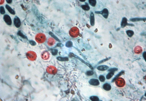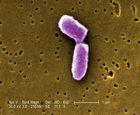
Cryptosporidium (Crypto)
Crypto is a diarrheal disease caused by a parasite. Infection occurs from ingesting or swimming in contaminated water. Common symptoms include diarrhea, nausea, vomiting, fever and stomach cramps. The parasite is protected by an outer shell that allows it to survive for long periods and makes it very resistant to chlorine.

Shigella
Shigella is a group of bacteria that cause fever, diarrhea and stomach cramps usually a day or two after exposure. The diarrhea is usually bloody but goes away in five to seven days. Infection occurs from contact with infected water or stool.
 Giardia
Giardia
This parasite is common in the U.S. It is found on surfaces or in water, soil or food that has been contaminated with human or animal feces. Symptoms of Giardia infection include diarrhea, stomach bloating and cramps and nausea.
 E coli
E coli
E coli is a member of a large group of bacterial germs that infect the intestinal tract. Though most strains are harmless, others can cause bloody diarrhea, urinary tract infection, nausea and vomiting. The infection is transmitted through contaminated water, food, exposure to infected persons or animals.
 Norovirus
Norovirus
This virus is found in the stool or vomit of infected people. It is transmitted through food, drinking liquids, direct contact with an infected person or touching contaminated objects. Norovirus can cause severe stomach illnesses including nausea, vomiting, diarrhea and stomach cramping.